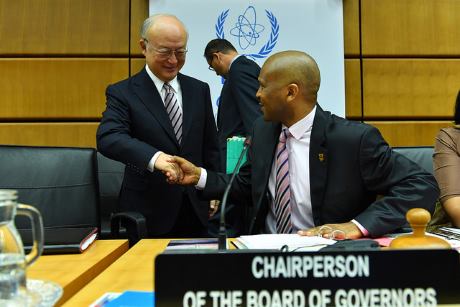Iran is continuing to implement its nuclear-related commitments, but the continuation and further development of North Korea's nuclear program are a cause for "grave concern", International Atomic Energy Agency (IAEA) Director General Yukiya Amano told the agency's board of governors yesterday.
 |
| Amano is welcomed to the IAEA Board of Governors meeting by board chairperson Tebogo Seokolo (Image: IAEA/Dean Calma) |
The IAEA has been verifying and monitoring Iran's implementation of its nuclear-related commitments under the 2015 Joint Comprehensive Plan of Action (JCPOA) since January 2016. Amano told the board.
"The nuclear-related commitments undertaken by Iran under the JCPOA are being implemented," he confirmed. "The Agency continues to verify the non-diversion of nuclear material declared by Iran under its Safeguards Agreement. Evaluations regarding the absence of undeclared nuclear material and activities in Iran remain ongoing," he said.
Amano said the agency would continue to implement the Additional Protocol, a legal document that supplements Iran's safeguards agreements, which significantly increases the IAEA's ability to verify the peaceful use of all nuclear material.
North Korea team
Amano said the IAEA continued to follow closely developments in the nuclear program of the Democratic People's Republic of Korea (North Korea). He said a nuclear test carried out by the country on 3 September - its sixth and largest since 2006 - was "extremely regrettable" and "in complete disregard of the repeated demands of the international community".
Amano said there were "indications" at the Yongbyon Experimental Nuclear Power Plant suggesting that the reactor was being operated, while there were indications consistent with the use of the reported centrifuge enrichment facility at the Yongbyon Nuclear Fuel Rod Fabrication Plant. The continuation and further development of the country's nuclear program were "a cause for grave concern," he said.
The IAEA in August established a dedicated team within its Department of Safeguards to enhance its ability to monitor North Korea's nuclear program, Amano said.
"The aim is to enhance our ability to monitor the DPRK's nuclear program, maintain updated verification approaches and procedures, remain prepared for the Agency's possible return to the country, and ensure the availability of appropriate verification technologies and equipment."
North Korea became a party to the Treaty on the Non-Proliferation of Nuclear Weapons (NPT) in 1985, with its NPT Safeguards Agreement entering into force in 1992, but it withdrew from IAEA membership in 1994 and from the NPT in 2003.
"I call upon the DPRK to comply fully with its obligations under all relevant resolutions of the UN Security Council and the IAEA, to cooperate promptly with the Agency, and to resolve all outstanding issues, including those that have arisen during the absence of Agency inspectors from the country," Amano said.
Nuclear's climate role
With 448 nuclear power reactors in operation in 30 countries, 57 under construction, and 28 countries currently considering, planning or starting nuclear power programs, with IAEA assistance, many countries expect nuclear power to play an increasingly important role in improving energy security and mitigating climate change, Amano said. Most of the operating reactors are more than 30 years old, but their operating lifespans could be significantly extended, provided they fulfil the requirements for safe operation. More attention should be paid to extending the operating lifetime of current nuclear power reactors "to respond to the challenge of climate change here and now", he said.
"Without nuclear power, it will be very difficult to achieve the Paris Agreement's goal of keeping the rise in global temperatures this century well below two degrees Celsius above pre-industrial levels," Amano said. The IAEA will participate in the United Nations Climate Change Conference - COP23 - to be held in Germany in November.
Amano also highlighted the inauguration in August of an IAEA Low Enriched Uranium Bank Storage Facility in Kazakhstan, and modernisation work at the IAEA's nuclear applications laboratories near Vienna, where a new Insect Pest Control Laboratory is to be inaugurated on 25 September.
Researched and written
by World Nuclear News




_18570.jpg)
_16159.jpg)
_18938.jpg)
_33584.jpg)





